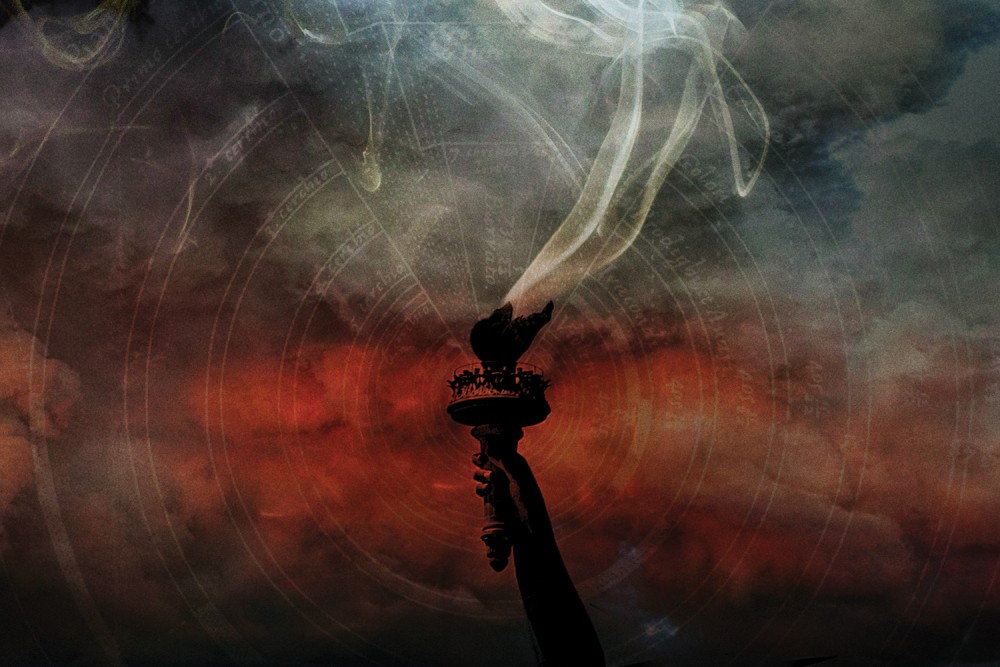American hell
In the last year of his life, Martin Luther King Jr.’s confidence in the politics of progressivism dimmed. Judgment became his refrain.

Century illustration
On April 4, 1968, hours before his assassination, from room 306 at the Lorraine Motel in Memphis, Martin Luther King Jr. phoned the office at Ebenezer Baptist Church back home in Atlanta. It was a Thursday, and he had to let the church secretary know his sermon title for Sunday’s service: “Why America May Go to Hell.”
He never had a chance to preach that sermon, but his title comes to mind whenever the injustices of this country feel overwhelming—when things go from bad to worse, from ordinary cruelties to unhinged brutality: Abu Ghraib, Trayvon Martin, Sandy Hook Elementary School, Michael Brown, Sandra Bland, Mother Emanuel AME, Obama’s clandestine drone warfare, Trump’s caging of immigrant children, Stoneman Douglas High School, the Tree of Life Congregation, George Floyd, Uvalde, Guantanamo Bay, Biden’s contribution of US money and weapons to Israel’s mass slaughter of Gazans. Too many horrors. And there are others, local horrors—unique to your life, unique to mine, countless names and events and places.
Read our latest issue or browse back issues.
I want to know the force of the word may in King’s sermon title. “America may go to hell”—did he mean that damnation was a possibility, that the destiny of the United States was at stake if the situation didn’t soon change? Or maybe he thought that a hellish fate was becoming more and more probable, a likely outcome given the social violence spiraling into wider spheres of life—the racism and economic exploitation at home and the carnage abroad in Vietnam, a war that had become a focus of his preaching and organizing since his “Beyond Vietnam” speech in New York City, exactly a year before his death.
What why did he have in mind as he worried that the country he loved was on a path to self-destruction, headlong down the broad road to hell on earth? “Why America may go to hell”—was his sermon going to include a list of sins, or was he planning on naming a singular, catastrophic evil?
This concern about the damnation of the United States was not a new theme for King. On March 9, 1968, at a mass meeting in Greenwood, Mississippi, he told the crowd, “America’s on the way to hell.” A few weeks earlier, in Montgomery, Alabama, he declared, “The judgment of God is on America now.” He asked the people in attendance to remember the Japanese internment—the result of a presidential executive order, justified by President Roosevelt’s fearmongering and his appeal to national security. “[A] nation that put as many Japanese in a concentration camp as they did in the forties . . . will put black people in a concentration camp,” King said. He linked episodes of racial animus across time, spasms of cruelty as political leaders flexed their control, testing the reach of their power. Scapegoating a demographic minority is a tried-and-true fascist tactic to whip up nationalist fervor within a population—to cohere citizens around a vision of belonging that requires an enemy. King witnessed the intensification of this type of racial othering, which he considered to be a politics of self-destruction, the disintegration of our peoplehood.
The King citations above come from The Preacher King, Richard Lischer’s landmark study of his sermons and speeches. “In the sermons of 1967 and 1968 new rhetorical elements begin to make their appearance,” Lischer notes. “King was self-consciously crossing the boundary from reform to revolution, liberalism to liberationism, announcing a more profound critique of the American system.” The shimmer of optimism faded from his speech; his confidence in the politics of progressivism dimmed. Judgment became his refrain.
King’s condemnations, Lischer adds, flowed from an overwhelming sadness—heartache from the injustices ravaging the country. “King’s most characteristic emotion is not rage but sorrow at the intractable sin of the people,” he writes. In a 1965 interview King recounted his initial hope that White ministers would lead their congregations to join the civil rights movement. “I ended up, of course, chastened and disillusioned,” he confessed. “The laxity of the white church collectively has caused me to weep tears of love.” He had believed in the God-infused goodness at work within his fellow Christians. Their refusal to participate en masse dashed his hope in the spiritual ties that bound sisters and brothers in the body of Christ—an existential solidarity in which the suffering of one member means the suffering of all, an ecumenical fellowship activated for the sake of mutual welfare and abundant life. In the face of such disappointment, King welled up with the sorrow of broken fellowship, of shattered love.
Lischer relates King’s words of judgment to his love for his country. “His anger was the comprehensive partner to his hope,” he writes in his introduction to the 2020 new edition of the book. “Without it, his hope would have lapsed into optimism or irrelevance. It is the comprehensiveness of his rage, along with its better-known companions love, justice, and equality, that will protect our country from its current demons.”
At the end of President Trump’s first week of office, after his onslaught of executive orders, Hakeem Jeffries posted on Elon Musk’s social media platform, X, a Christian message of reassurance, of trust in the progressive arc of the moral universe. “Presidents come and Presidents go,” the Democratic congressional leader wrote. “Through it all. God is still on the throne.”
At best, Jeffries’s words captured the faith of the psalmist, who reminds us that the tenure of political leaders is brief. Death cuts short their power. “When their breath departs, they return to the earth; on that very day their plans perish” (Psalm 146:4). At worst, his words displayed the liberal smugness that has become the norm for his party, which has delivered electoral loss after loss. His self-assured stoicism, despite the damage unleashed in our society from the president’s desk, struck me as tone-deaf. A deportation—of a mother or father, a sister or brother, an aunt or uncle, a grandparent or cousin—changes the course of history for every member of that family. Their world falls apart, even if Jeffries’s remains the same.
Jeffries appealed to God’s unshakable reign from the heavenly throne room without a second thought about judgment. King, on the other hand, worried that the soul of his beloved country was hanging in the balance—that the United States might end up in hell, might become hell on earth. In the Gospel of Matthew, Jesus prophesies that at the end of the ages the Son of man, seated on the throne of glory, will judge the social practices of nations (25:32). King had biblical warrant for his dread about the eternal consequences of American sins. The Jesus of Matthew 25 declares an ominous future for nations that do not provide health care for the sick, food aid for the hungry, dignity for the imprisoned, and social provisions for foreigners. To deprive people of what they need for communal well-being may result in “eternal punishment” (25:46). The invocation of God’s throne should shake the confidence of national leaders.
King warned crowds about God’s judgment while he continued to organize a movement for the collective good of the country. His relentless work on behalf of the oppressed did not display the belief of someone who thought that the United States was predestined for damnation. It was rather that the United States may or may not go to hell; time would tell.
His assassination cut short his plans for a Poor People’s Campaign, a mass protest in Washington, DC. “We will place the problems of the poor at the seat of government of the wealthiest nation in the history of mankind,” King said as he outlined the significance of the event. “We need it to bring about a new kind of togetherness . . . to bring allies together and to bring the coalition of conscience together.” King wrote these words within a month of his death. They were published in Look magazine, under the title “Showdown for Nonviolence,” on April 16, 1968, almost two weeks after his assassination. The article ends with this sentence: “All of us are on trial in this troubled hour, but time still permits us to meet the future with a clear conscience.”
These are troubled times. The political form of our civic life is not guaranteed. We will have to struggle, together, for what we care about, for the people we care about—for neighbors who’ve become part of our lives, for the wholeness and health of our society, even as the Trump administration expropriates our collective wealth for the benefit of the president and his cronies.
We have every reason for despair as political leaders dismantle long-standing institutional structures while looting our public goods. At the end of The Preacher King, Lischer makes an observation about King’s despair at the form of our country he saw coming into being: “The more pessimistic he grew with regard to humanity, the more optimistic he became about God.” Despite what we’ve become as a country, despite our personal and political sins, God never tires from the work of righteousness. This means we’re always invited to join in God’s love for the world—to offer our loaves and fishes, to beg for mercy.
To believe in divine grace is to entrust ourselves to the Holy Spirit who has promised to burn away the sins of the world like chaff. Christians are people who organize their lives as a prayer against this hell we’ve made of ourselves.






